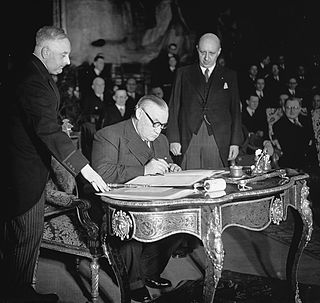
The Council of Europe is an international organisation with the goal of upholding human rights, democracy and the rule of law in Europe. Founded in 1949, it is Europe's oldest intergovernmental organisation, representing 46 member states from Europe, with a population of approximately 675 million as of 2023; it operates with an annual budget of approximately 500 million euros.

The European Coal and Steel Community (ECSC) was a European organization created after World War II to integrate Europe's coal and steel industries into a single common market based on the principle of supranationalism which would be governed by the creation of a High Authority which would be made up of appointed representatives from the member states who would not represent their national interest, but would take and make decisions in the general interests of the Community as a whole. It was formally established in 1951 by the Treaty of Paris, signed by Belgium, France, Italy, Luxembourg, the Netherlands, and West Germany and was generally seen as the first step in the process of European integration following the end of the Second World War in Europe. The organization's subsequent enlargement of both members and duties ultimately led to the creation of the European Union. However, it was forced into action in 1952.

The European Economic Community (EEC) was a regional organisation created by the Treaty of Rome of 1957, aiming to foster economic integration among its member states. It was subsequently renamed the European Community (EC) upon becoming integrated into the first pillar of the newly formed European Union (EU) in 1993. In the popular language, the singular European Community was sometimes inaccurately used in the wider sense of the plural European Communities, in spite of the latter designation covering all the three constituent entities of the first pillar. The EEC was also known as the European Common Market (ECM) in the English-speaking countries, and sometimes referred to as the European Community even before it was officially renamed as such in 1993. In 2009, the EC formally ceased to exist and its institutions were directly absorbed by the EU. This made the Union the formal successor institution of the Community.

The European Union is a geo-political entity, created in 1993, covering a large portion of the European continent. It is founded upon numerous treaties and has undergone expansions and secessions that have taken it from six member states to 27, a majority of the states in Europe.

The Treaty of Rome, or EEC Treaty, brought about the creation of the European Economic Community (EEC), the best known of the European Communities (EC). The treaty was signed on 25 March 1957 by Belgium, France, Italy, Luxembourg, the Netherlands and West Germany, and it came into force on 1 January 1958. Originally the "Treaty establishing the European Economic Community", and now continuing under the name "Treaty on the Functioning of the European Union", it remains one of the two most important treaties in what is now the European Union (EU).

Paul-Henri Charles Spaak was an influential Belgian Socialist politician, diplomat and statesman who thrice served as the prime minister of Belgium and later as the second secretary general of NATO. Along with Robert Schuman, Alcide De Gasperi and Konrad Adenauer, he was a leader in the formation of the institutions that evolved into the European Union.

Walter Hallstein was a German academic, diplomat and statesman who was the first president of the Commission of the European Economic Community and one of the founding fathers of the European Union.

The European Communities (EC) were three international organizations that were governed by the same set of institutions. These were the European Coal and Steel Community (ECSC), the European Atomic Energy Community, and the European Economic Community (EEC), the last of which was renamed the European Community (EC) in 1993 by the Maastricht Treaty establishing the European Union. The European Union was established at that time more as a concept rather than an entity, while the Communities remained the actual subjects of international law impersonating the rather abstract Union, becoming at the same time its first pillar. In popular language, however, the singular European Community was sometimes used interchangeably with the plural phrase, in the sense of referring to all three entities.

The European Political Co-operation (EPC) was the common term for the co-ordination of foreign policy between member states of the European Communities (EC) from its inception in 1970 until the EPC was superseded by the new European Union's (EU) Common Foreign and Security Policy (CFSP) pillar upon the entry into force of the Maastricht Treaty in November 1993.

The Luxembourg Compromise was an agreement reached in January 1966 to resolve the "Empty Chair Crisis" which had caused a stalemate within European Economic Community (EEC).

The Treaty of Brussels, also referred to as the Brussels Pact, was the founding treaty of the Western Union (WU) between 1948 and 1954, when it was amended as the Modified Brussels Treaty (MTB) and served as the founding treaty of the Western European Union (WEU) until its termination in 2010. The treaty provided for the organisation of military, economic, social and cultural cooperation among member states as well as a mutual defence clause.

The year 1948 marked the beginning of the institutionalised modern European integration. With the start of the Cold War, the Treaty of Brussels was signed in 1948 establishing the Western Union (WU) as the first organisation. In the same year, the International Authority for the Ruhr and the Organization for European Economic Co-operation, the predecessor of the OECD, were also founded, followed in 1949 by the Council of Europe, and in 1951 by the European Coal and Steel Community, with the ensuing moves to create further communities leading to the Treaty of Rome (1957).

The Messina Conference of 1955 was a meeting of the six member states of the European Coal and Steel Community (ECSC). The conference assessed the progress of the ECSC and, deciding that it was working well, proposed further European integration. This initiative led to the creation in 1957 of the European Economic Community and Euratom.

The Spaak Committee was an Intergovernmental Committee set up by the Foreign Ministers of the six Member States of the European Coal and Steel Community (ECSC) as a result of the Messina Conference of 1955. The Spaak Committee started its work on 9 July 1955 and ended on 20 April 1956, when the Heads of Delegation of the six Member States of the ECSC approved the Spaak report. The committee worked on two main topics, one was the creation of a general common market and the other one was the establishment of a European Community for the peaceful use of atomic energy.

The Intergovernmental Conference on the Common Market and Euratom was held in Brussels and started on 26 June 1956 with a session in the Grand Salon of the Belgian Foreign Ministry. The negotiations went on at the Château of Val-Duchesse in Auderghem (Brussels) and would continue until March 1957. The conference was held to draft the Treaties establishing the European Economic Community (EEC) and the European Atomic Energy Community. The conference built on the results of the Spaak Report of the Spaak Committee and the decision taken at the Venice Conference to prepare the plan for the establishment of a common market and the establishment of a European Community for the peaceful use of atomic energy.

The Spaak Report or Brussels Report on the General Common Market is the report drafted by the Spaak Committee in 1956. The Intergovernmental Committee, headed by Paul-Henri Spaak, presented its definitive report on 21 April 1956 to the six governments of the member states of the European Coal and Steel Community.

The Benelux memorandum of 1955 was a document drafted by the three Benelux countries on 18 May 1955 as a means to reviving European integration on the basis of a general common market.

Johan Willem "Wim" Beyen was a Dutch politician and diplomat of Liberal signature and businessman. Beyen played an important role in the creation of the European Economic Community and is regarded as one of the Founding fathers of the European Union.

The history of the European Union between 1993 and 2004 was the period between its creation and the 2004 enlargement. The European Union was created at the dawn of the post–Cold War era and saw a series of successive treaties laying the ground for the euro, foreign policy and future enlargement. Three new member states joined the previous twelve in this period and the European Economic Area extended the reach of the EU's markets to three more.

This article outlines the history of the Common Security and Defence Policy (CSDP) of the European Union (EU), a part of the Common Foreign and Security Policy (CFSP).









